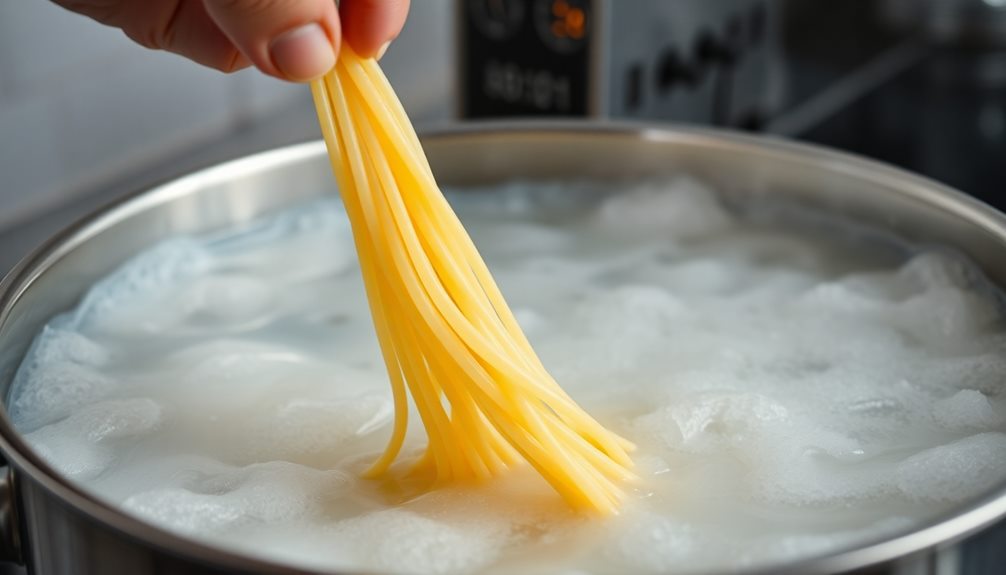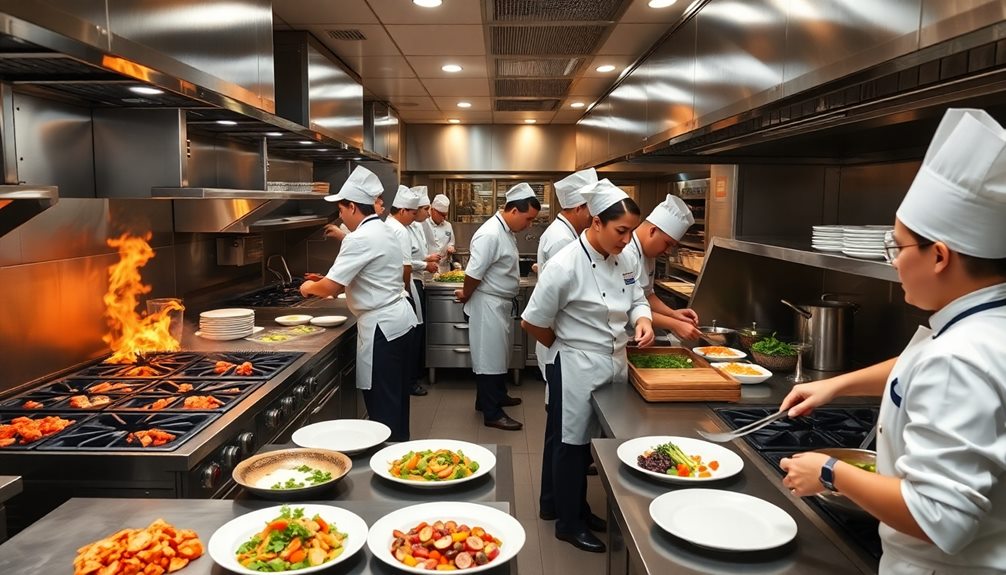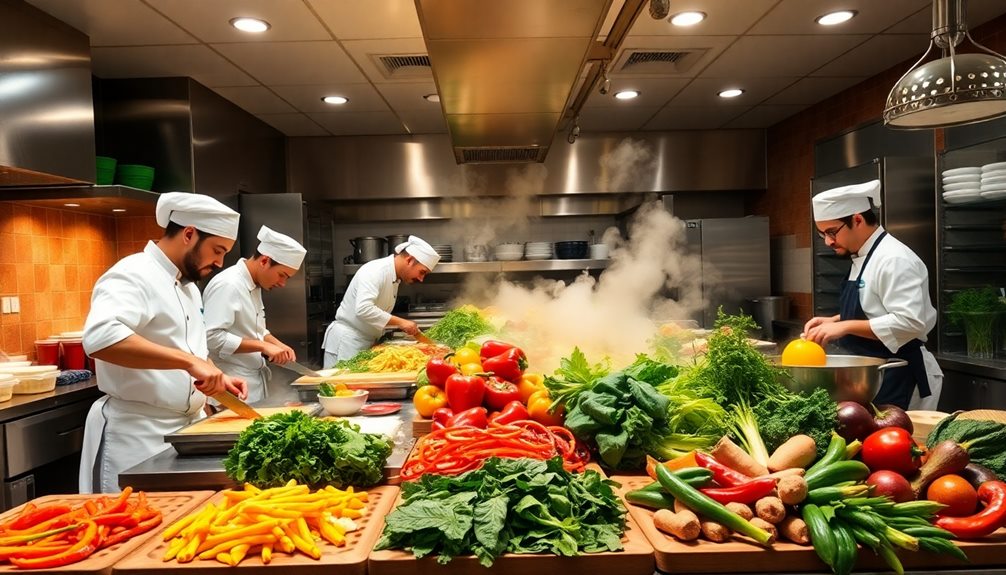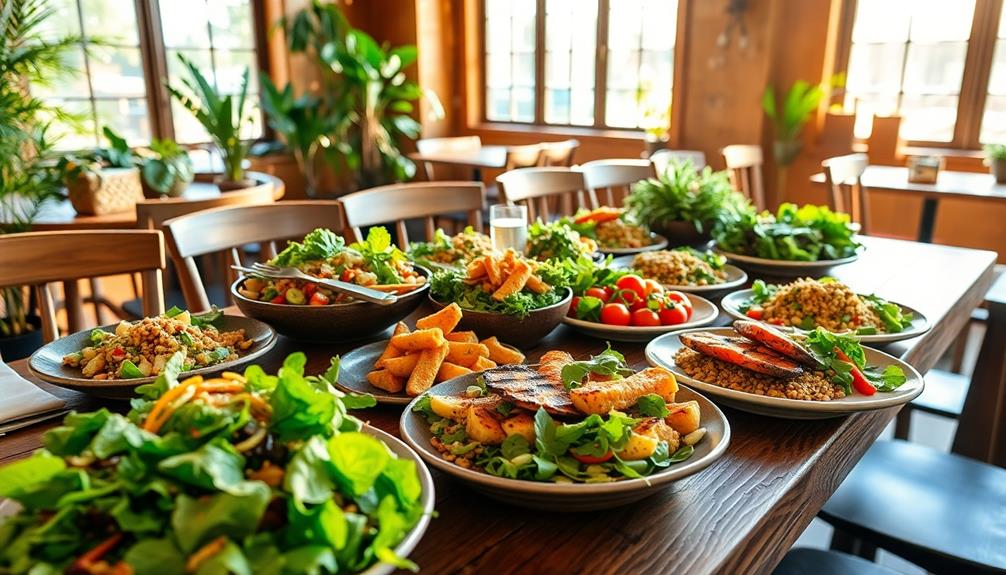Restaurants keep pasta al dente by carefully timing the cooking process. They cook it for 1-2 minutes less than the package instructions, ensuring it retains its firmness. Rapidly cooling the pasta in an ice bath halts cooking and prevents mushiness. When reheating, they briefly boil or sauté the pasta in sauce, which enhances flavor while restoring its ideal texture. Adding reserved starchy pasta water also helps the sauce cling better, achieving that restaurant-quality finish. If you're curious about more techniques and tips, you'll discover many ways to elevate your pasta cooking skills.
Key Takeaways
- Restaurants cook pasta for 1-2 minutes less than package instructions to achieve the perfect al dente texture.
- They use a rolling boil to prevent sticking and overcooking while maintaining consistent cooking times.
- Pre-cooked pasta is stored in oiled trays and chilled rapidly to retain its firmness before serving.
- Reheating techniques, like boiling briefly or sautéing in sauce, restore al dente texture and enhance flavor absorption.
- Reserved starchy pasta water is crucial for emulsifying sauces and ensuring they cling to the noodles effectively.
Importance of Cooking Time
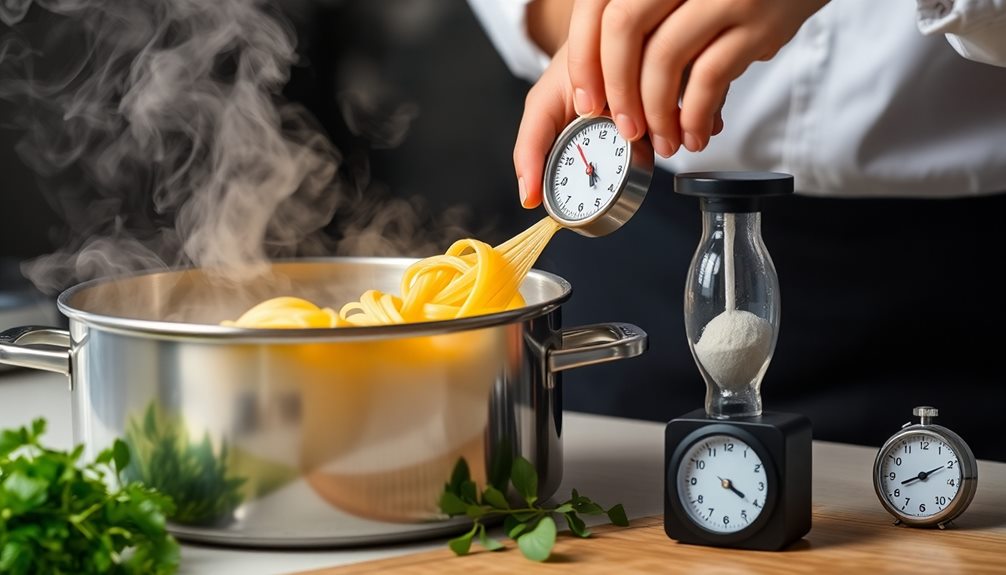
Cooking time is vital when it comes to achieving that perfect al dente pasta. If you've ever enjoyed a dish at a restaurant, you might've noticed how the pasta has a firm, textured bite. That's no accident! Chefs typically cook pasta for 1-2 minutes less than the package instructions recommend. For regular dried pasta, this means cooking it for about 8-10 minutes, while fresh pasta cooks much quicker, usually in about 2 minutes.
Timing's essential; you can't just walk away while the pasta's boiling away. Instead, you'll need to monitor it closely and taste it to guarantee it reaches that desired al dente stage before draining.
Maintaining a consistent boiling temperature is key, too. If the water cools down, the pasta can become mushy, ruining that perfect bite.
Some restaurants even use a double cooking technique. They pre-cook the pasta to just shy of al dente, allowing for a quick finish in the sauce when an order comes in.
Techniques for Pre-Cooking Pasta
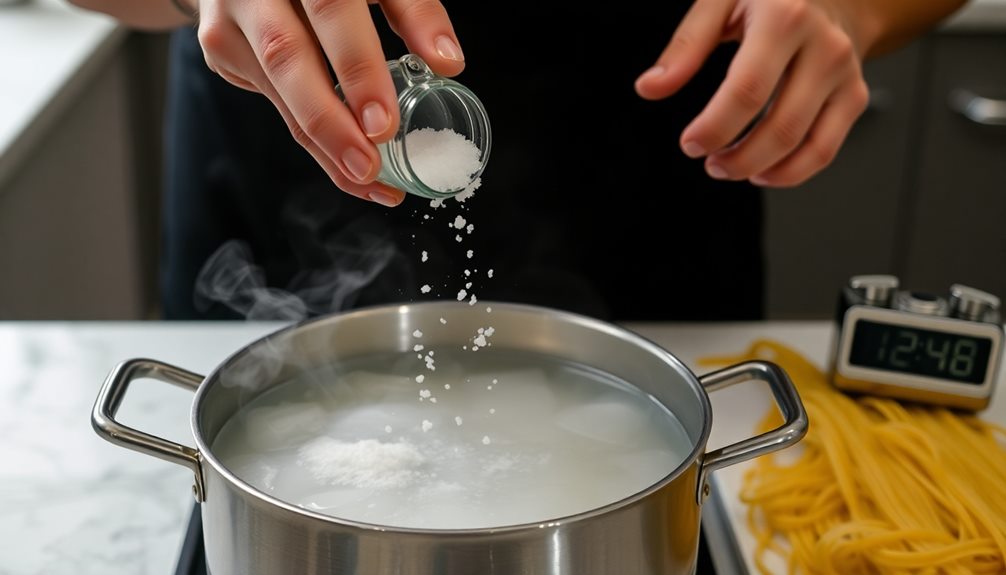
To achieve that perfect al dente texture, many restaurants employ a technique called pre-cooking. This method involves boiling the pasta just under al dente, typically 1-2 minutes less than the package instructions. By doing this, chefs guarantee it can finish cooking once combined with sauce, enhancing flavor and texture.
After boiling the pasta, it's vital to cool it rapidly in an ice bath. This halts the cooking process and prevents bacterial growth, keeping the pasta safe and maintaining its ideal texture.
To prevent sticking during storage, restaurants often take these steps:
- Spread pre-cooked pasta on oiled baking trays
- Chill the trays to cool the pasta quickly
- Store the pasta in airtight containers
- Use a little oil to coat the pasta before storage
When it's time to serve, the pre-cooked pasta is briefly immersed in boiling water or heated in a sauté pan with sauce. This finishing touch brings the pasta to al dente perfection and guarantees it's ready to enjoy quickly as possible.
This technique allows restaurants to serve delicious pasta without sacrificing quality or texture.
Reheating Methods for Al Dente
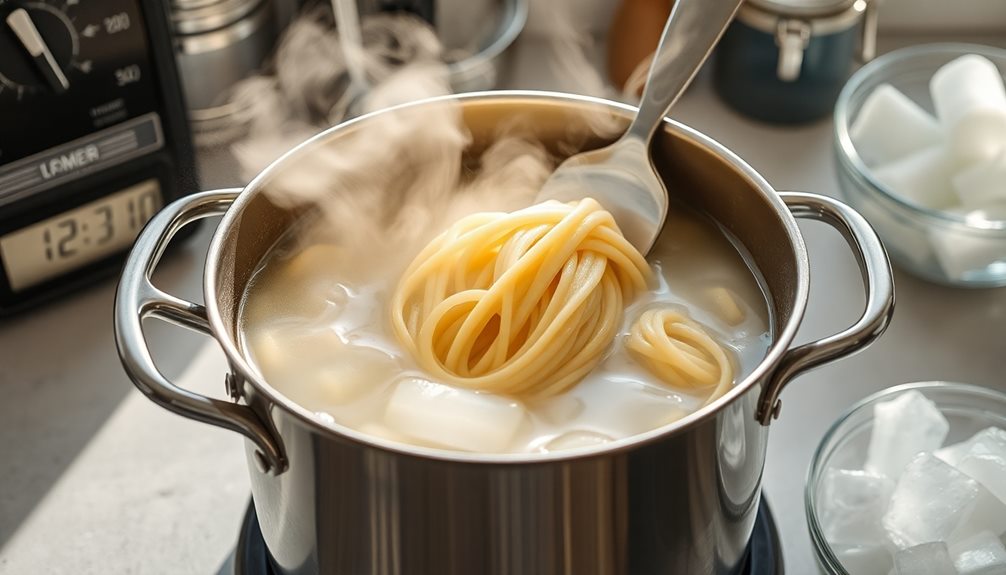
When it comes to reheating pre-cooked pasta, using the right methods guarantees you maintain that coveted al dente texture. Here are some effective techniques to take into account:
| Method | Time | Benefits |
|---|---|---|
| Boiling | 30 seconds | Quick restoration of texture |
| Sautéing in Sauce | 2-3 minutes | Flavor absorption, gentle reheating |
| Adding Starchy Water | As needed | Enhances sauce adherence |
For boiling, simply immerse your chilled pasta in boiling water for about 30 seconds. This quick method revives its firmness without overcooking. Alternatively, sautéing the pasta in a heated sauce is another fantastic approach; it not only warms the noodles but allows them to soak up flavors, creating a tasty dish.
Don't forget about starchy pasta water! Adding a splash during reheating can greatly improve sauce adherence, making your meal even better. Remember, timing and temperature control are vital in this process. Keep a close eye on your pasta to achieve that ideal al dente texture. With these methods, you'll enjoy perfectly reheated pasta every time.
Flavor Integration With Sauces
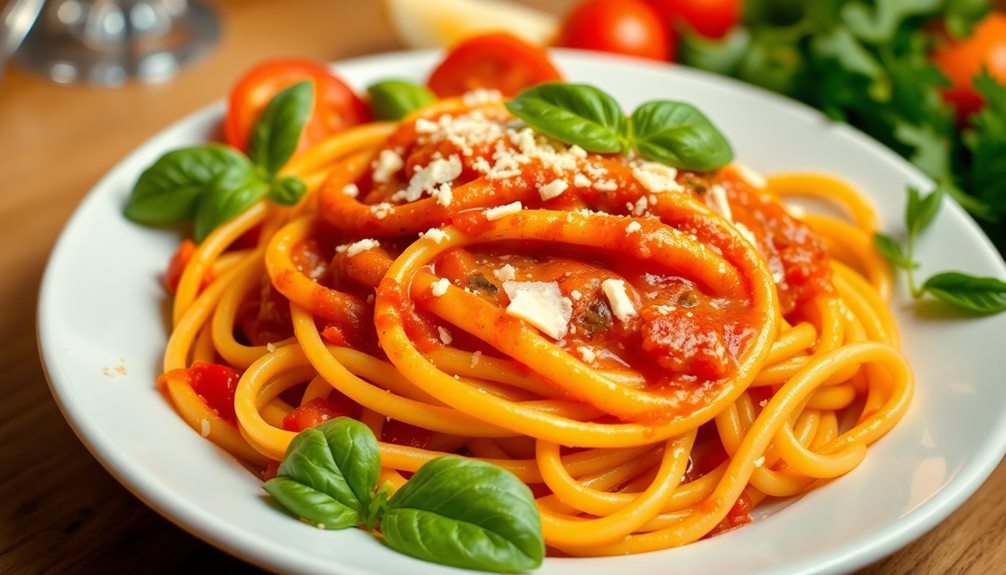
When you cook pasta, achieving harmony with the sauce is key to enhancing flavor.
By using starchy pasta water, you can emulsify the sauce, allowing it to cling to the noodles and elevate the dish.
This technique not only improves the taste but also helps maintain that perfect al dente texture you crave.
Sauce and Pasta Harmony
Achieving the perfect harmony between sauce and pasta is essential for creating a delicious dish. This balance elevates your culinary experience, making each bite a delight.
When you finish cooking your pasta in the sauce, you allow the noodles to absorb the flavors while keeping them firm and al dente. Here's how to create that harmony:
- Cook pasta until it's just shy of al dente.
- Sauté the pasta with the sauce over low heat.
- Add reserved cooking water to adjust the sauce's consistency.
- Make certain the sauce clings beautifully to each noodle.
Emulsifying With Pasta Water
Emulsifying with pasta water is a game-changer for creating sauces that cling perfectly to your noodles. This starchy cooking water is essential for enhancing flavor and ensuring your sauce has the right consistency.
Before you drain your pasta, make sure to reserve a cup of that rich liquid. Adding a splash of pasta water to your sauce not only creates a creamy texture but also helps it coat the pasta evenly.
The starch in the pasta water acts as a binding agent, thickening the sauce and making it more cohesive.
When you combine the pasta and sauce over low heat, gradually incorporating the reserved water, it allows your noodles to absorb those delicious flavors while maintaining that al dente texture you love.
Storage Tips for Cooked Pasta
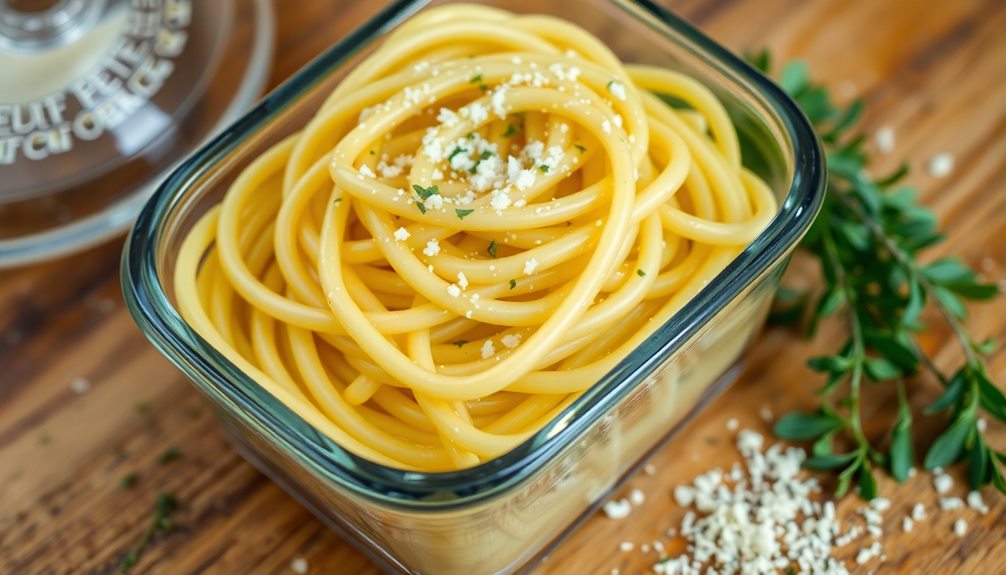
To keep your cooked pasta at its best, store it in an airtight container within two hours of cooking. This helps maintain moisture and prevents bacterial growth.
Once stored properly, refrigerated cooked pasta can last for 3-5 days. To enhance your storage experience, consider these tips:
- Lightly coat the pasta with olive oil to prevent sticking.
- Chill cooked pasta immediately in an ice bath to maintain its al dente texture.
- For longer storage, vacuum seal your cooked pasta to extend its shelf life.
- When reheating, add a splash of reserved pasta cooking water to restore moisture.
Common Mistakes to Avoid
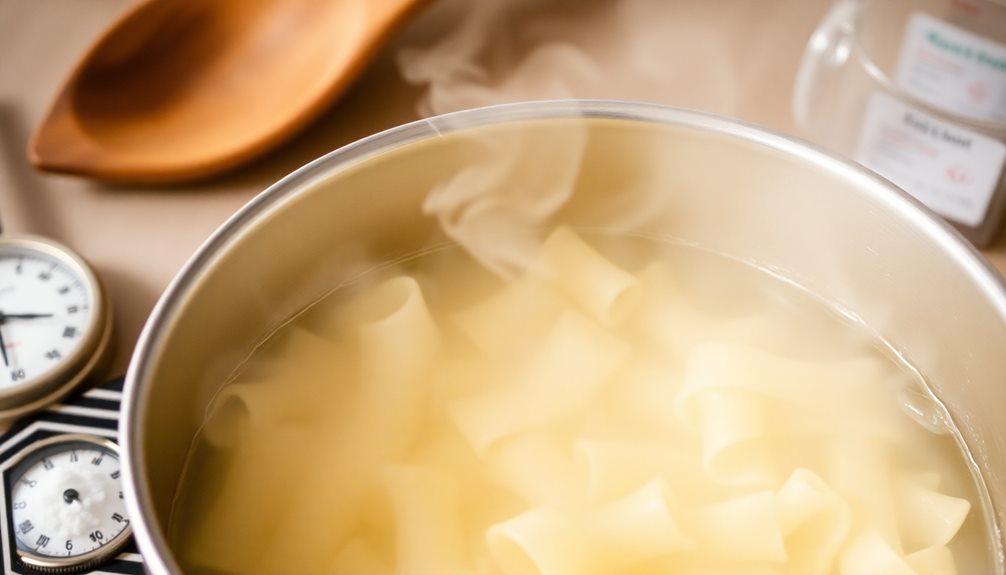
When cooking pasta, it's easy to make a few common mistakes that can ruin your dish.
Overcooking it leads to a mushy texture, while neglecting to salt the water results in bland flavors.
Don't forget to reserve some starchy pasta water; it's essential for making your sauce stick and enhancing the overall taste.
Overcooking Pasta Issues
Achieving the perfect pasta texture requires vigilance, as overcooking can quickly turn a delightful dish into a mushy disappointment. To avoid this, keep these common mistakes in mind:
- Not timing the cooking process properly; pasta continues to cook after you drain it.
- Failing to maintain a rolling boil, which can cause noodles to stick and overcook.
- Forgetting to stir during the initial cooking phase, leading to clumping and uneven cooking.
- Neglecting to reserve some starchy cooking water, essential for sauce adherence.
To guarantee your pasta is perfectly al dente, pull it from the boiling water a minute or two early. Remember, it'll keep cooking even after you drain it!
A consistent boil helps maintain even cooking, while stirring prevents clumping. If you reserve a bit of the cooking water, you can achieve a more cohesive sauce that clings to your pasta beautifully.
Neglecting Salt Importance
Many home cooks overlook the importance of seasoning pasta cooking water, which can lead to bland noodles and a lackluster overall dish. Salted water is a game changer in the cooking process. When you add about ¾ teaspoon of salt per quart of water, it allows the flavor to penetrate the pasta effectively, enhancing its taste.
Unsalted pasta won't hold its own when paired with sauces, often resulting in a dull dish where the flavors clash rather than complement.
Moreover, salting the water plays an essential role in achieving that perfect al dente texture. The salt helps promote even cooking, ensuring every bite is just right. Restaurants understand this principle and prioritize salting their water to maintain the quality and taste of their pasta.
If you skip this important step, you're likely to end up with bland pasta that doesn't do justice to your sauce.
Next time you boil pasta, remember that a simple act of salting the water can elevate your dish tremendously. Don't let your efforts go to waste with underseasoned noodles—embrace the importance of salt!
Skipping Pasta Water Usage
One of the biggest mistakes home cooks make is skipping the use of reserved pasta water. This starchy liquid is vital for transforming your dish from bland to brilliant. When you're cooking the pasta, don't forget to save some of that water! Here's why it matters:
- Flavor Infusion: The starch in pasta water enhances the sauce, allowing it to cling better to the noodles. Additionally, using ingredients rich in nutrients, like celery juice, can further elevate the overall health benefits of your dish.
- Moisture Addition: It adds necessary moisture, preventing your dish from becoming dry.
- Consistency Control: You can adjust the sauce's thickness, ensuring it perfectly coats each strand.
- Binding Agent: It acts as a binding agent, helping to keep the pasta and sauce cohesive.
If you neglect to use pasta water, you risk a dry and uninviting dish. The flavor derived from cooking the pasta is fundamental for achieving restaurant-quality results.
Frequently Asked Questions
How Do Italian Restaurants Keep Pasta Warm?
Italian restaurants keep pasta warm by using a Bain Marie, where they monitor the temperature closely. They often drizzle olive oil or butter to prevent sticking, ensuring the pasta remains moist and ready for serving.
How Do You Store Pasta Al Dente?
Did you know cooked pasta can last up to 48 hours in the fridge? To store it al dente, drain it, drizzle with olive oil, and place it in an airtight container to keep it fresh.
How Do You Pre Cook Pasta for a Restaurant?
To pre-cook pasta for a restaurant, you boil it until it's just under al dente, chill it in an ice bath, then store it on oiled trays. This keeps it ready for quick service.
How Should Pasta Be Cooked for a La Carte Service?
For a la carte service, you should pre-cook pasta just shy of al dente, chill it, and then quickly reheat in boiling water or toss it in a hot sauce to enhance flavor and texture.
Conclusion
In the world of pasta, achieving that perfect al dente texture is like tuning a fine instrument—too much time, and you've got a soggy mess. By mastering cooking times and reheating methods, you can serve pasta that sings with flavor and firmness. Just like a chef who knows their craft, you'll create dishes that leave guests savoring every bite. So, keep these tips in mind, and let your pasta dance on the plate, perfectly al dente every time!
